The UNESCO world cultural heritage site that is Hoi An is globally renowned for its timeless charm and visual beauty. But it’s increasingly being recognized for its culinary treasures, too.

Think of Hoi An and vivid images come to mind. Yellow heritage buildings. Quirky cobbled streets. Rows of multi-colored lanterns. But to fully explore Hoi An, indulge senses other than that of sight. In particular, you should sample Hoi An’s food to truly get a ‘taste’ of the place.
Hoi An’s fascinating history as a trading port is not only evident in its architecture. It’s reflected in its food, too. As a former ‘melting pot’ of traders, Hoi An’s cuisine features influences from China, Japan, the West, and more.
In addition to history, location plays a part in Hoi An’s gastronomy. Some of the dishes you’ll find are variations on national favorites. Others are associated with Quảng Nam province of Central Vietnam. Then there are dishes that are distinct ‘Hoi An. These delicious creations incorporate ingredients that can only be found here. For example, many delicacies only include the freshest greens from the nearby Tra Que Vegetable Village.
The diversity and distinctiveness of Hoi An’s food have caught the attention of Lonely Planet (who dubbed Hoi An a ‘global food paradise’; TripAdvisor (who ranked it among the ‘Top 25 best culinary destinations in the world’; and the World Association of Chefs (who recognized Hoi An as Vietnam’s food capital).
If you appreciate food as a culture, why not book a foodie tour or cooking class while you’re in Hoi An? Or you can simply plan a gastronomic itinerary of your own. Here are the top 10 delicacies, and where to go to try them.
Cao lầu (pork rice noodles)
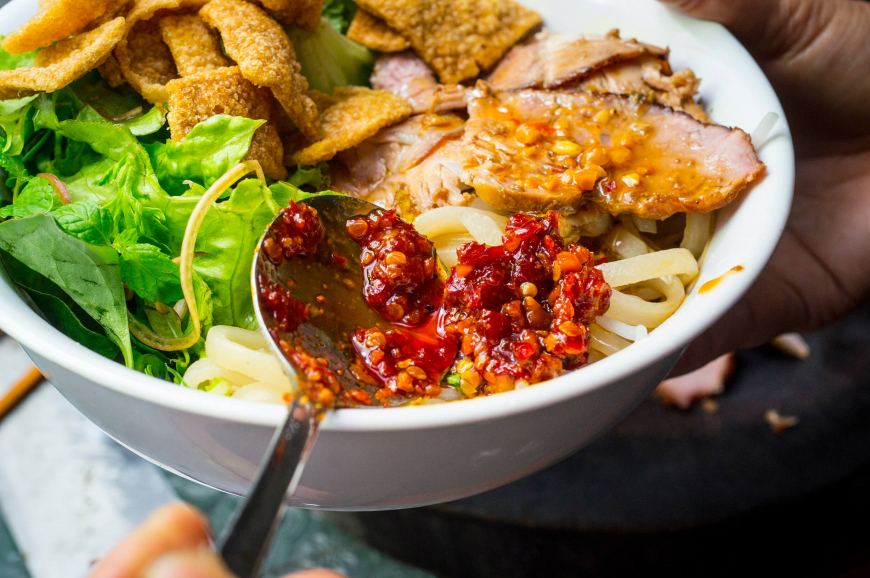
If you’re going to try just one dish, this is ‘Hoi An in a bowl’. It’s unique to the town and made from local ingredients according to a secret recipe. The name (“high storey’) apparently harks back to the 17th century, when it was served to wealthy people who ate upstairs at restaurants. What’s special about it? Firstly, the noodles. They’re said to be made with calcium-rich water from the 10th-century Ba Le well. Wood ash from Melaleuca trees on the nearby Cham islands is mixed into this water. The resulting noodles are big and firm, with a unique texture resembling Japanese Udon. These are topped with pork-belly slices (think Chinese char siu), bean sprouts, fresh herbs, and dry pancake. This is finished off Vietnamese-style: with a spoonful of broth, chili, and lime. Superb!
TRY:
- Cao Lầu bà Bé: 1 Trần Phú, Cẩm Châu
- Quán Cao Lầu Thanh: 26 Thái Phiên, Phường Minh An
- Morning Glory Original: 106 Nguyễn Thái Học, Phường Minh An
- Ong Hai (Mr. Hai Restaurant): 6A Trương Minh Lượng, Cẩm Châu
Bánh ướt thịt nướng (grilled pork spring rolls)
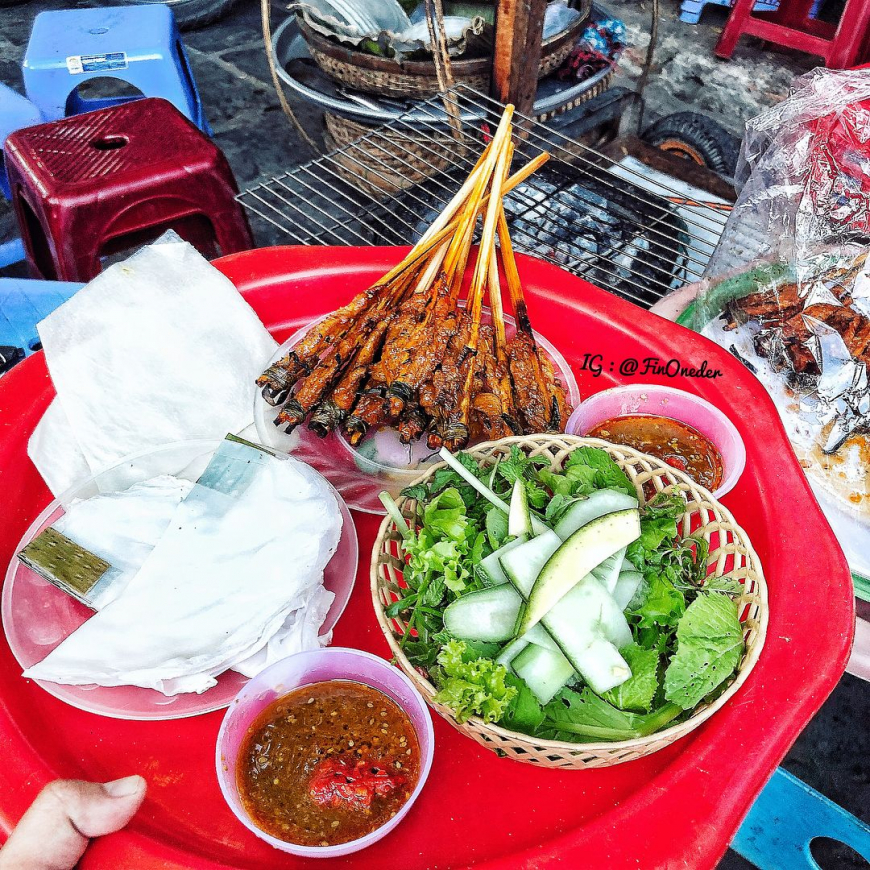
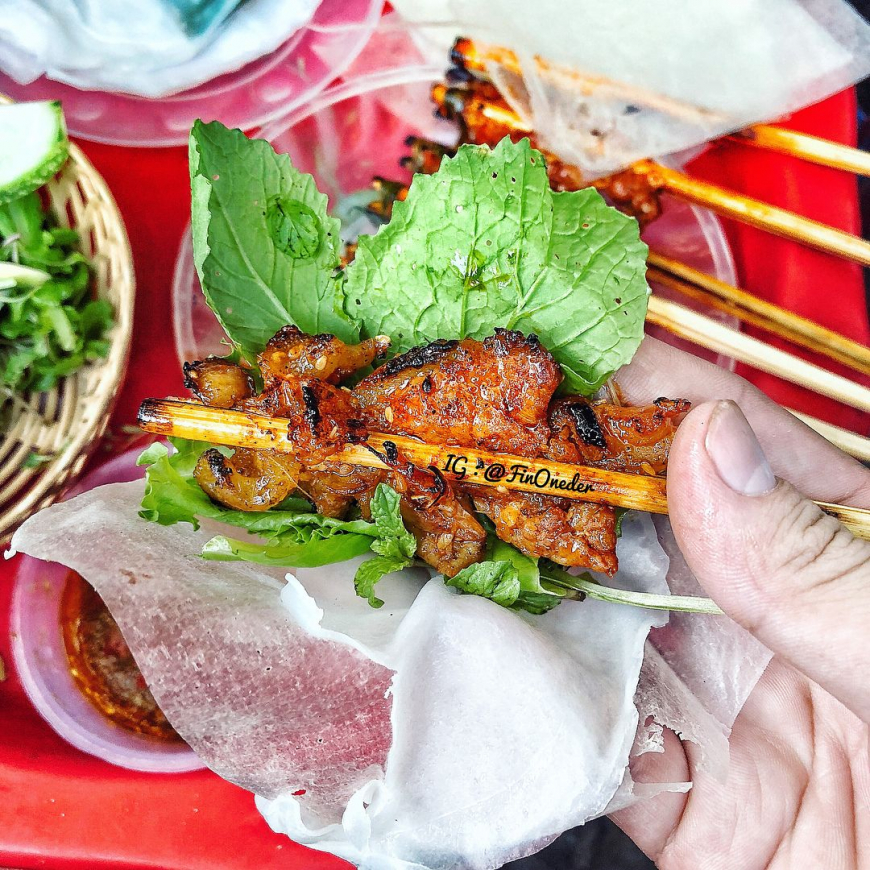
source: IG: @FinOneder
This is a dish you may get to assemble yourself. Fun! The main ingredient is marinated pork cooked on lemongrass skewers over a charcoal grill (‘thịt nướng’). The meat is removed and stacked with raw ingredients (typically salad, herbs, cucumber, and star fruit). Then it’s all wrapped in wet rice paper (bánh ướt). Finally, the rolls are dipped in a sauce, usually made from soybean paste, peanuts, sesame, fish sauce, and chili. The result? A delicious combo of smokey and fresh tastes and textures.
TRY:
- Bale Well Restaurant: 51 Trần Hưng Đạo, Phường Minh An
- Sidewalk stalls next to Kazik Park: 13 Trần Phú, Cẩm Châu
- Bà Hường: 31 Tiểu La, Phường Minh An
Mì Quảng (quang noodles)
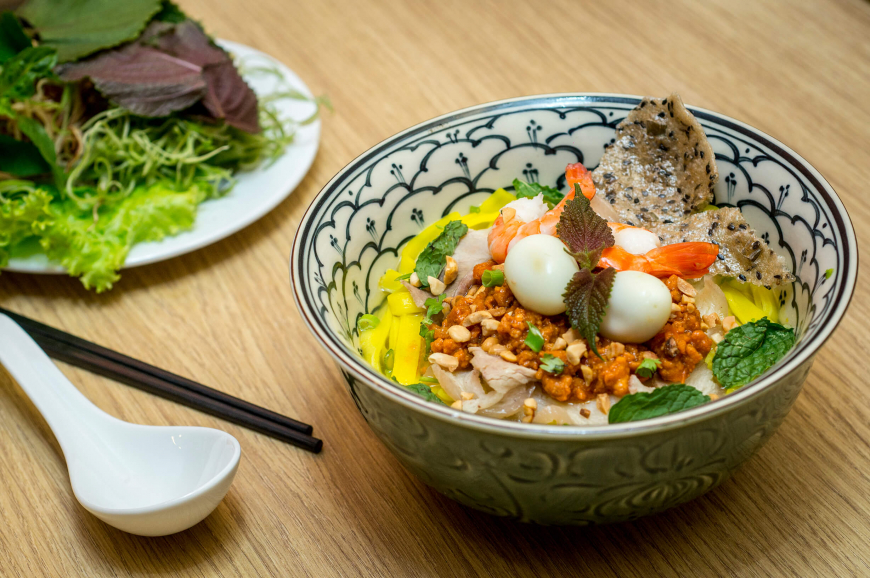
Variations of this ‘soup-salad’ dish can be found across Quảng Nam province. Quảng noodles are flat, chewy rice noodles often infused with turmeric. These are placed atop fresh ingredients and tossed with proteins including pork, chicken, beef, shrimp, or quail eggs. A yummy ladle of broth is added. Rice crackers, fresh herbs, roasted peanuts, and chili add crunch and pops of flavor.
TRY:
- Mì Quảng Dì Hát: 81 Phan Chu Trinh, Phường Minh An
- Mì Quảng Ông Hai - Mr. Hai Noodles: 6A Trương Minh Lượng, Cẩm Châu
- Mì Quảng Hát: 4 Phan Chu Trinh, Phường Minh An
Bún thịt nướng (grilled pork over vermicelli rice noodles)
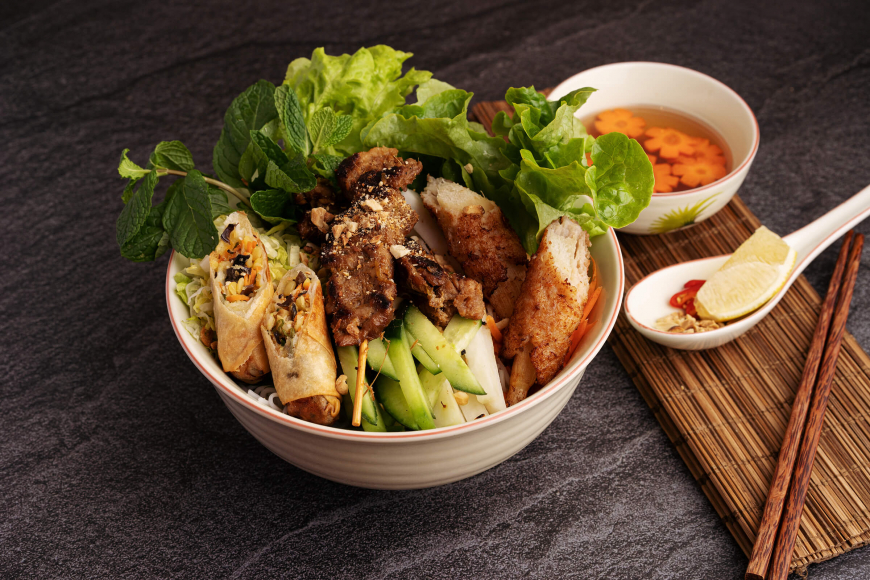
On a hot day, this plate is both satisfying and refreshing. Much like the bún chả of the North, this street food is made up of slices of barbecued pork, rice noodles, and fresh salad greens. But with bún thịt nướng, the ingredients are all mixed into the satay-type sauce, which is thicker than the bún chả dipping sauce. Perfect for a quick bite.
TRY:
- Bún Thịt Nướng: 81 Trần Cao Vân,Phường Cẩm Phô
- Cô Bảy Hội An: 12 Trần Quang Khải
- Ty Ty Quán: 17/6 Hai Bà Trưng, Phường Minh An
Cơm gà (chicken rice)
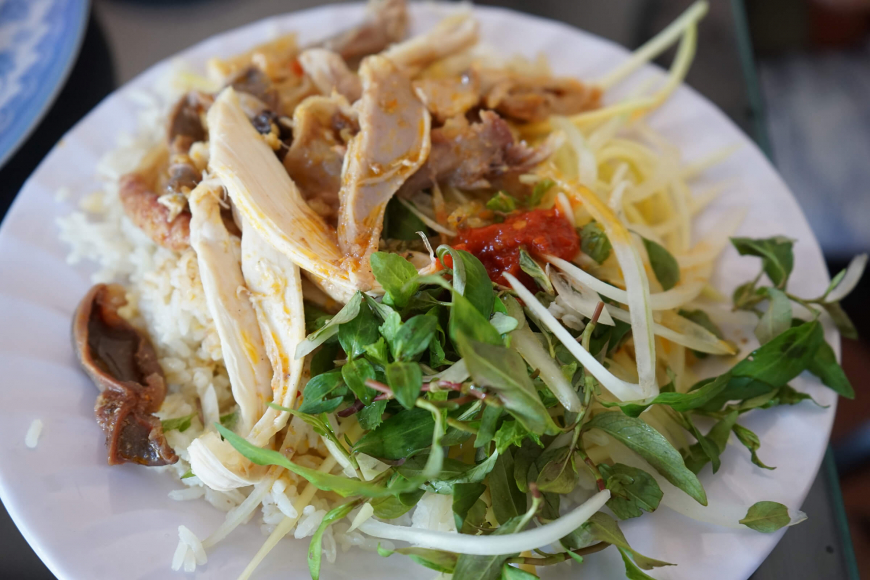
Craving rice rather than noodles? Your go-to should be chicken rice, available all over Hoi An. (In fact, some quip that you haven’t really been to Hoi An if you haven’t tried its cơm gà.) Since it’s similar to the chicken rice from countries such as Singapore, Thailand and Malaysia, it’s believed to have originated from the Hainanese dish imported by Chinese immigrants. But in Hoi An, the chicken comes shredded. Plus, the fresh sides are distinctly Vietnamese. The fragrant yellow pilaf rice is flavored with chicken broth and turmeric. Alongside the poached chicken, you’ll get herbs, a bowl of chicken soup, and a sour papaya salad. All in all: a well-balanced meal.
TRY:
- Cơm Gà Bà Buội: 22 Phan Chu Trinh, Phường Minh An
- Hoi An chicken rice: 47/2 Tran Hung Dao
Bánh xèo (savoury Vietnamese pancake)
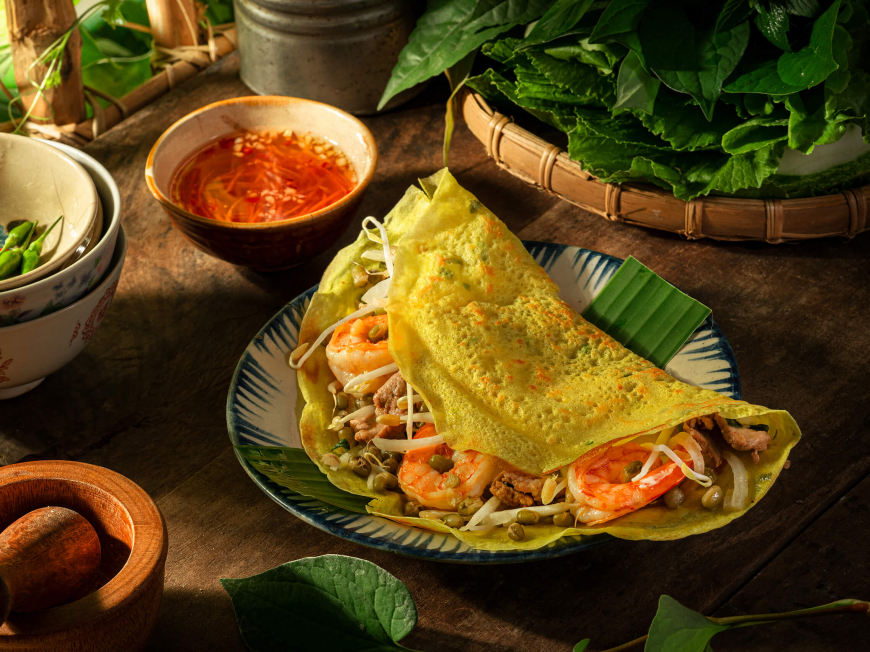
Visitors to Vietnam are easily enamored by the savory ‘pancake-spring roll’ you can get all over the country. Why? First, it’s another dish you assemble yourself (note: it can get messy!). Second, the pancakes differ from place to place (try as many as you can!). Third, it’s the perfect combo of fried food with fresh food. Once your pancakes are served, slice them up and roll them with herbs and greens into the dry rice paper provided. Then dip away in the sauce.
TRY:
- Bánh Xèo Cô Anh, Sông Hoài: 59/32, 18/8 Phường Minh An
- Bánh Xèo Minh Tú Chợ Hội An: Chợ ẩm thực, Old Town
Bánh Bao Bánh Vạc (‘white rose’ savoury dumpling)
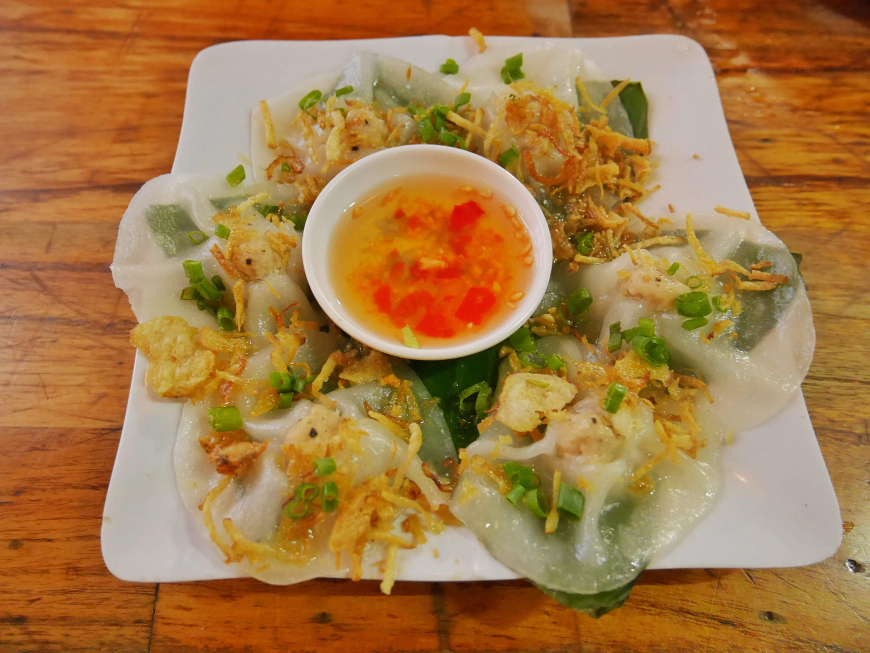
The name of this dumpling, unique to Hoi An, comes from its rose-like shape. Its recipe is apparently guarded by the third generation of the same family that has long provided these dumplings across Hoi An. The steamed dumpling is made from rice flour and the same well water used in cao lầu. It’s filled with minced pork, shrimp, and mushrooms. And topped with crispy spring onion and shallots.
TRY:
- White Rose Restaurant (run by the family who specialises in these dumplings): 533 Hai Bà Trưng, Phường Cẩm Phổ
Bánh mì (Vietnamese baguette sandwich)
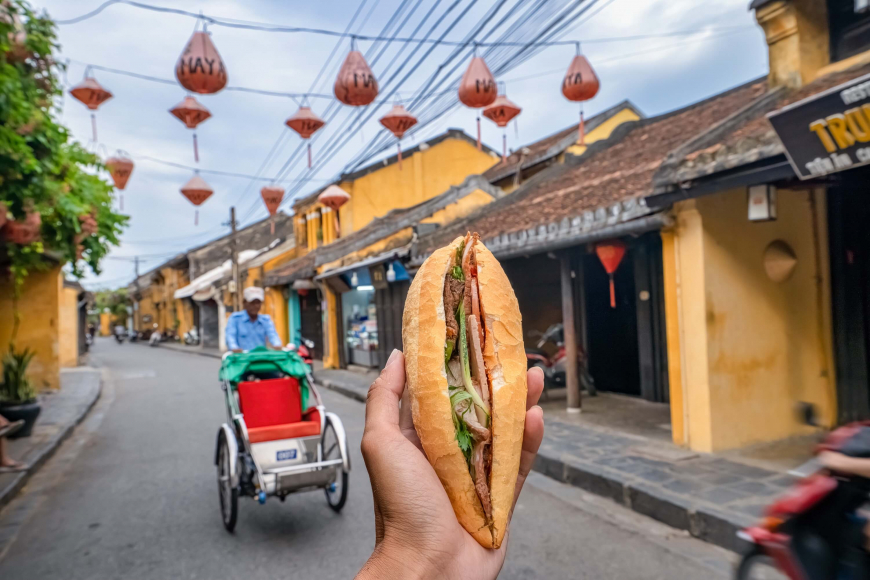
As with all places in Vietnam, you can find this baguette-like staple sandwich at street stalls across Hoi An. While you can get bánh mì everywhere, the late American chef and travel journalist Anthony Bourdain said those served at Bánh Mì Phượng are the best in Hoi An.
TRY:
- Bánh Mì Phượng: 2B Phan Chu Trinh, Cẩm Châu
- Madam Khanh - The Banh Mi Queen: 115 Trần Cao Vân, Phường Minh An
Bánh xoài (mango cake)
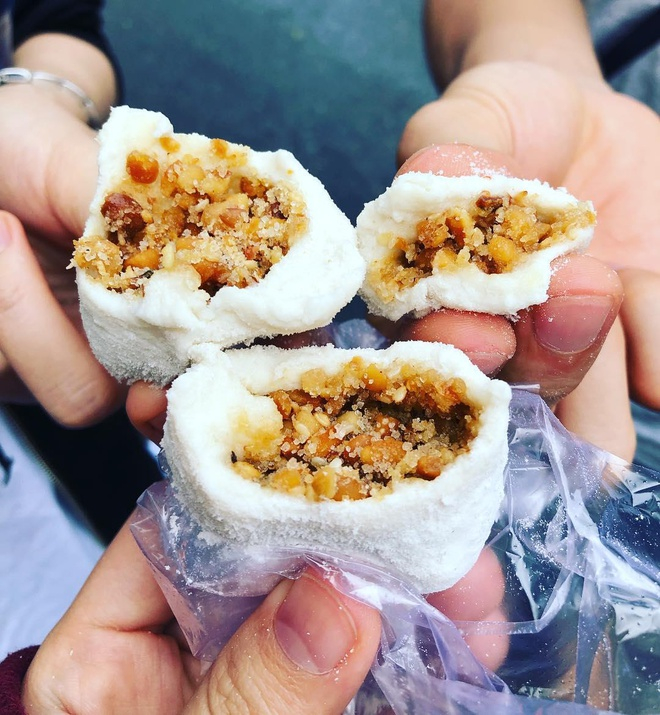
source: Internet
Fancy something sweet? You can’t go wrong with a deliciously chewy ‘mango’ cake. No, it doesn’t include any mango (it’s named for its shape). But it does include glutinous rice flour, crushed peanuts, and brown sugar. Some compare it to Japanese mochi or Chinese tang yuan rice balls.
TRY:
- The street-vendor stalls close to the Japanese bridge.


